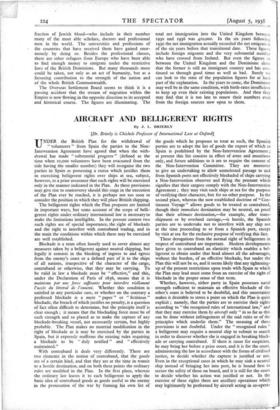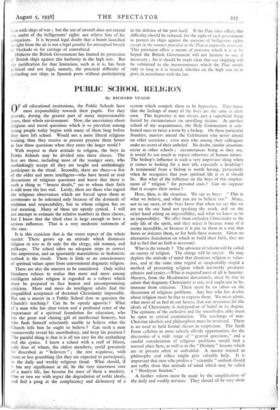AIRCRAFT AND BELLIGERENT RIGHTS
By .1. L. BRIERLY
[Dr. Brierly is Chichele Professor of International Law at Oxford] The belligerent rights which the Plan proposes are limited in important ways, but some account of the scope of belli- gerent rights under ordinary international law is necessary to make the limitations intelligible. In the present context two such rights are of special importance, the right of blockade and the right to interfere with contraband trading, and in the main the conditions within which these may be exercised are well established.
Blockade is a term often loosely used to cover almost any measures taken by a belligerent against neutral shipping, but legally it consists in the blocking of ingress to and egress from the enemy's coast or a defined part of it to the ships of all nations, irrespective of the character of the cargo, contraband or otherwise, that they may be carrying. To be valid in law a blockade must be " effective," and this, under the Declaration of Paris of 1856, means that it is maintenu par une force suilisante pour interdire reellement faeces du littoral de l'ennemi. Whether this condition is satisfied in any particular case, or whether on the contrary a professed blockade is a mere " paper " or " fictitious " blockade, the breach of which justifies no penalty, is a question of fact often difficult to determine, but the principle itself is clear enough ; it means that the blockading force must be of such strength and so placed as to make the capture of any blockade-breaking vessel, not necessarily certain, but highly probable. The Plan makes no material modification in the right of blockade as it may be exercised by the parties in Spain, but it expressly reaffirms the existing rules requiring a blockade to be " duly notified " and " effectively maintained."
With contraband it deals very differently. There are two elements in the notion of contraband, that the goods are of a certain kind, and that they are at the time in transit to a hostile destination, and on both these points the ordinary rules are modified in the Plan. In the first place, whereas the ordinary law leaves it to each belligerent to apply the basic idea of contraband goods as goods useful to the enemy in the prosecution of the war by framing his own list of the goods which he proposes to treat as such, the Spanish parties are to adopt the list of goods the export of which to Spain is prohibited by the Non-Intervention Agreement ; at present this list consists in effect of arms and munitions only, and future additions to it are to require the consent of the Non-Intervention Committee. They are moreover to give an undertaking to alio* unmolested passage to and from Spanish ports not effectively blockaded of ships carrying a Non-Intervention observer and flying the pennant which signifies that their cargoes comply with the Non-Intervention Agreement ; they may visit such ships at sea for the purpose of verifying their character, but for no other purpose. In the second place, whereas the now established doctrine of "Con- tinuous Voyage " allows goods to be treated as contraband, though their immediate destination may be neutral, on proof that their ultimate destination,—for example, after trans- shipment or by overland carriage,—is hostile, the Spanish parties are to undertake not to interfere with any ship not at the time proceeding to or from a Spanish port, except by visit at sea for the exclusive purpose of verifying this fact.
These derogations from the normal right of belligerents in respect of contraband are important. Modern developments have given to contraband an elasticity which enables a bel- ligerent to obtain under that head almost all the advantages, without the burden, of an effective blockade, but under the Plan this will not be so, and it seems likely that any tightening- up of the present restrictions upon trade with Spain to which the Plan may lead must come from an exercise of the right of blockade in the proper sense of that term.
Whether, however, either party in Spain possesses naval strength sufficient to maintain an effective blockade of the other's coast is believed to be doubtful, and this uncertainty makes it desirable to stress a point on which the Plan is quite explicit ; namely, that the parties are to exercise their rights according to "the recognised rules of international law," and that they may exercise them by aircraft only " in so far as this can be done without infringement of the said rules or of the principles which underlie them." The meaning of these provisions is not doubtful. Under the " recognised rules " a belligerent may require a neutral ship to submit to search in order to discover whether she is engaged in breaking block- ade or carrying contraband. If there is cause for suspicion, he may bring her before a prize court, and it is for the court, administering the law in accordance with the forms of civilised justice, to decide whether the capture is justified or not. Even in the exceptional cases in which he may sink a neutral ship instead of bringing her into port, he is bound first to secure the safety of those on board, and it is still for the court to decide whether his action was justified or not. In the exercise of these rights there are ancillary operations which may legitimately be performed by aircraft acting in co-opera- non with ships of war ; but the use of aircraft does not extend the ambit of the belligerents' rights nor relieve him of his obligations. It is beyond legal doubt that a bomb launched at sight frOm the air is not a legal penalty for attempted breach of blockade or for 'carriage of contraband. Hitherto the British Government has limited its protection of British ships against this barbarity to the high seas. But the justification for that limitation, such as it is, has been political and not legal, namely, the practical difficulty of defending our ships in Spanish ports without participating in the defence of the port itself. If the Plan takes effect, this difficulty should be reduced, for the right of each government to protect its ships against the exercise of belligerent rights except in the manner provided in the Plan is expressly reserved. This provision offers a means of pressure which it is to be hoped the British Government will not hesitate to use, if necessary ; for it should be made clear that our shipping will be submitted to the inconveniences which the Plan entails only so long as it is treated, whether on the high seas or in port, in accordance with the law.



































 Previous page
Previous page